May I wish you a Happy Christmas and a Wonderful New Year from all of us at Pimento Poets…...
Monday, December 15, 2014
Saturday, December 13, 2014
Some background information concerning the Magna Carta.
 |
| King John signs the Magna Carta. (Photo credit: Wikipedia) |
The Magna Carta was signed in June 1215 between the barons of Medieval England and King John. 'Magna Carta' is Latin and means "Great Charter". The Magna Carta was one of the most important documents of Medieval England.
It was signed (by royal seal) between the feudal barons and King John at Runnymede near Windsor Castle. The document was a series of written promises between the king and his subjects that he, the king, would govern England and deal with its people according to the customs offeudal law. Magna Carta was an attempt by the barons to stop a king - in this case John - abusing his power with the people of England suffering.
Why would a king - who was meant to be all powerful in his own country - agree to the demands of the barons who were meant to be below him in authority ?
England had for some years owned land in France. The barons had provided the king with both money and men to defend this territory. Traditionally, the king had always consulted the barons before raising taxes (as they had to collect it) and demanding more men for military service (as they had to provide the men). This was all part of the Feudal System.
So long as English kings were militarily successful abroad, relations with the barons were good. But John was not very successful in his military campaigns abroad. His constant demands for more money and men angered the barons. By 1204, John had lost his land in northern France. In response to this, John introduced high taxes without asking the barons. This was against feudal law and accepted custom.
John made mistakes in other areas as well. He angered the Roman Catholic Church. The pope, vexed by John's behaviour, banned all church services in England in 1207. Religion, and the fear of Hell, were very important to the people including the barons. The Catholic Church taught the people that they could only gain entrance to Heaven if the Catholic Church believed that they were good enough to get there. How could they show their goodness and love of God if the churches were shut ? Even worse for John was the fact that the pope excommunicated him in 1209. This meant that John could never get to Heaven until the pope withdrew the excommunication. Faced with this, John climbed down and accepted the power of the Catholic Church, giving them many privileges in 1214.
1214 was a disastrous year for John for another reason. Once again, he suffered military defeat in an attempt to get back his territory in northern France. He returned to London demanding more money from taxes. This time the barons were not willing to listen. They rebelled against his power. The barons captured London. However, they did not defeat John entirely and by the Spring of 1215, both sides were willing to discuss matters. The result was the Magna Carta.
Related articles
Thursday, December 4, 2014
Guest Poet: Ted Edwards
‘Resettlement’ in the East
By Ted Edwards, a Quaker from Lincolnshire.
Prologue
On January 20, 1942, Reinhard Heydrich convened the ‘Wannsee’ Conference at a secluded villa near Berlin, to organise the “final solution to the Jewish question.” Present were fifteen men, all military or officials from government agencies with powers to implement the “Evacuation of all Jews to the East”. Participants at this conference used euphemisms to obscure their agreed plan, which was the mass deportation of Jews to killing centres. This policy was carried out under the deceptive guise of “Resettlement in the East.”
In railway cattle trucks they went,
Jews forced out by ‘resettlement’.
In locked and putrid trucks packed tight,
they suffered, travelling day and night.
At least a thousand trains were used,
in each, three thousand souls abused.
These numbers just statistics tell,
for all inside, the trains to hell.
Such pain, vast numbers tend to hide,
but dare you join the Jews inside?
Pick any truck, they’re all the same,
and try to feel their awful pain.
Bewildered, hungry, bitter cold,
and sick with fear, both young and old,
save for the fretful babes that cry
because their mothers’ milk runs dry.
Their toilet, just an unscreened drum,
so much for them to overcome.
They helped each other brave this fear,
too private for the telling here.
The slow and jolting stopping train,
increased these anxious people’s strain.
And as there was no outside view,
their sense of isolation grew.
Most of the people on this train
from Czechoslovakia came.
Among the people bruised and sore;
a Jewish family of four.
Both Ivan (seven) and Judit (four)
crouched cold and hungry on the floor.
Their mother Sara stood nearby
with Marta (one), too weak to cry.
But Sara dared to hope and pray,
her husband Morris came this way;
slave worker, eastwards, sent last year,
perhaps they might resettle near?
Now two long days and nights have passed,
then silence: had they arrived at last?
Soon, shouted orders from outside
made Sara’s children, terrified.
The door flew open; blinding light!
The SS guard; a worrying sight.
“GET OUT, and leave your luggage near
and join that line AT ONCE you hear.”
All scrambled out as best they could,
their cramped legs aching when they stood.
And thus to Auschwitz II they came,
or Birkenau, its other name.
With luggage piled they joined the line,
but would the foul air clear with time?
Perhaps these poor folk couldn’t tell,
the nature of that dreadful smell.
Among the thousands standing there
was Sara, with a mother’s care;
calms her children with affection
as they waited for ‘Selection’.
‘Selected’ to the left or right,
determined their immediate plight.
Those ‘right’ were starved and worked to death,
those ‘left’; gas chambers; choking breath. . .
Then one by one by two by three,
they shuffled as a family.
Such dread in Sara’s heart that day,
should one be sent the other way.
A Nazi faced the shuffling line,
his casual wave, the trivial sign
that separated families there;
their parting grief, too much to bear.
Sara and Marta; ‘left’ they went,
Judit and Ivan too were sent.
I saw them hand-in-hand depart,
a picture that still breaks my heart.
Who knows what Sara thought that day,
as hand-in-hand she led away
her children to ‘resettlement’.
Who could imagine what that meant?
What happened next I will not tell,
this Jewish family went through hell.
‘The Holocaust’, man’s greatest crime,
should not be told in simple rhyme.
Save only this; ‘Let this place be
A warning to humanity,
Forever crying in despair,’
‘REMEMBER’ pleads the plaque now there.
Epilogue
Morris Steinberg (35); Sara Liberman (27); Ivan Hief (7); Judit Hirsch (4) and Marta Berliner (1), ‘travelled’ from Czechoslovakia to Auschwitz where they were all murdered in 1944. I was a boy of ten in 1944, and I well remember, perhaps just a little later, seeing a newsreel showing people walking to the gas chambers, and in particular a proud young woman holding a baby to her left shoulder, her right hand holding a little boy’s hand who in turn was holding his even younger sister’s hand. This picture upsets me to this day, and I have taken the liberty of creating a similar family with real people who suffered the same fate; I pray they will all forgive me. So many hoped to be reunited with their lost menfolk, that I hope Morris too will not feel used in any shallow way.
On May 15th 1944 mass deportation of Hungarian Jews began, and over the next 55 days some 438,000 Jews were sent to Auschwitz on 147 trains. Bearing in mind that one murder is a tragedy, I hesitate to do the ‘statistical’ maths; but 500 trains would ‘barely account’ for the Auschwitz crime alone. My figure of 1000 trains in the rhyme probably needs to be increased considerably.
As a tall young fair-haired boy in 1940, I often wonder what my role in this monstrous criminal tragedy might have been if Germany had invaded England; after all, I would have been ideal recruitment material for the ‘Hitler Youth’.. . . .
In one sense this poem has taken a long time to write; many times I tried, but it seemed that an extreme event such as this was beyond the reach of poetry. Then in 2011 I visited the Holocaust Centre, Laxton, Newark with my friend Paul Wojna, a Quaker, who has made the pilgrimage to Auschwitz three times. With Paul’s helpful encouragement I tried again to write a poem, but this time choosing a simple narrative rhyme about the journey and selection at Auschwitz, never trying to ‘moralise or come to terms’ (whatever that may mean) with this most terrible of all crimes.
So many survivors reported that they heard the last plea from those who perished: “Remember – do not let the world forget”. Holocaust survivors themselves make this heartfelt plea “Never again”. . . . There is a plaque today between crematoria I and II at Auschwitz II – Birkenau with these words in many languages:-
Forever let this place be
A cry of despair
And a warning to humanity.
Where the Nazis murdered
About one and a half million
Men, women and children,
Mainly Jews
From various countries
Of Europe.
Let Lord Sacks the Chief Rabbi have the last word “We cannot change the past, but by remembering it, we might just change the future.”
Acknowledgement: Yad Vashem, Holocaust Remembrance Authority, Jerusalem.
Monday, December 1, 2014
Pimento Poets: Next Meeting of Pimento Poets: 8th December, 2014…...
Pimento Poets: Next Meeting of Pimento Poets: 8th December, 2014…...: Lincoln.2 (Photo credit: Wikipedia ) Our next time together will be on 8th December at the Pimento Tearooms, Lincoln. Please bring some work with you to read out.
Starting at 10.30 am…...
Starting at 10.30 am…...
Monday, November 17, 2014
New Poetry by Susan Wallace: Drawing the Shade.
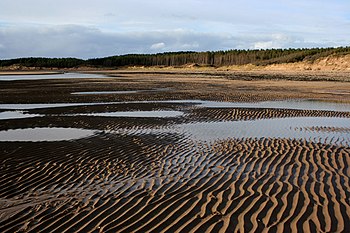 |
| English: Ripples in the sand. The beach at Newborough at low tide. (Photo credit: Wikipedia) |
Drawing the shade
This beach is never blank.
In spite of the wind’s whip and the swipe of the waves
It lies under sky like an open page,
Its ridged lines written by the tide
As though the moon has pressed her frowning forehead to the sand.
Here bladderwrack spells out darkly
In gothic script the water-logged names of the sea;
And the dot-dash of cockle and razor shell
Encodes a secret, deep and salty.
The pattern of runes printed by sea-birds’ feet is untranslatable.
We and our shadows walk the shore.
Yours is short and never still. Mine,
A measure of my days, stretches long to the West.
Seabirds, circling, freckle the sand with shade.
I throw my arms wide, hair a halo in the east wind
And you begin to draw
With your spade around the shape my shadow makes.
The plastic blade slices wet sand. Your small hand
Cannot hold the line, swerving out of true.
You make a botch of me. We laugh, and race towards the sea.
And this is what the years will do.
Some time distant you will half-recall the day,
The beach whose mysteries we pondered; and Grandma -
Outline wavering, face no longer clear –
Sketched in sand between one tide and the next.
Copyright : Susan Wallace 2014
Friday, November 14, 2014
Next Meeting of Pimento Poets: 8th December, 2014…..
 |
| Lincoln.2 (Photo credit: Wikipedia) |
Please bring some new work with you.
We'll start at 10.30 am and finish around lunchtime.
Refreshments will be available to purchase at the Tearooms.
A warm welcome is extended to everyone interested in listening to good poetry. if you have some yourself please bring to read out and share……..
Poet Laureate for Lincolnshire
Hi All,
Gerry gave us some information about the prospect of a Poet Laureat in Lincolnshire.
This is repeated below:
Poet Laureat of Lincolnshire
Thousand Pound Award Competition
Launched on 2nd October by the Mayor of Lincoln
The competition for the most original piece of poetry. Rules of the competition are few and simple. No poetry longer than 30 lines and the topic has to be some aspect of life in Lincolnshire.Must not have been published previously.
CLOSING DATE IS APRIL 5th 2015.
All queries should be directed to the Poetry Society: 67 Doddington Road, Lincoln, LN6 7EY
Tel: 01522 695110
Please keep an eye out for updates.
Regards,
Vernon
Gerry gave us some information about the prospect of a Poet Laureat in Lincolnshire.
This is repeated below:
Poet Laureat of Lincolnshire
Thousand Pound Award Competition
Launched on 2nd October by the Mayor of Lincoln
The competition for the most original piece of poetry. Rules of the competition are few and simple. No poetry longer than 30 lines and the topic has to be some aspect of life in Lincolnshire.Must not have been published previously.
CLOSING DATE IS APRIL 5th 2015.
All queries should be directed to the Poetry Society: 67 Doddington Road, Lincoln, LN6 7EY
Tel: 01522 695110
Please keep an eye out for updates.
Regards,
Vernon
A new poem by Maureen Sutton: Ad infinitun.
AD INFINITUN
The moat at the Tower of London
has become like a river of poppy-red blood.
Look again, closer, because
the blood of beheaded queens runs deep. +
A king, two young princes, traitors
the innocent, nonconformists all slaughtered.
Blood never dries on the hands of a king.
It drips from the hands of leaders
who send us to war, then lay wreaths.
Those not born before World Wars
commemorate the hundredth year of the
Great War by planting ceramic poppies.
Spilt blood has seeped into foreign fields
on home ground, on no-man’s land
on desert sands, on frozen waste.
It has splattered across skies, coloured seas.
As flowers keep growing
blood shed from the fallen flows on;
A tidal bore on the Thames.
Maureen Sutton
09 11 20
COPYRIGHT MAUREEN SUTTON 09 11 20
The moat at the Tower of London
has become like a river of poppy-red blood.
Look again, closer, because
the blood of beheaded queens runs deep. +
A king, two young princes, traitors
the innocent, nonconformists all slaughtered.
Blood never dries on the hands of a king.
It drips from the hands of leaders
who send us to war, then lay wreaths.
Those not born before World Wars
commemorate the hundredth year of the
Great War by planting ceramic poppies.
Spilt blood has seeped into foreign fields
on home ground, on no-man’s land
on desert sands, on frozen waste.
It has splattered across skies, coloured seas.
As flowers keep growing
blood shed from the fallen flows on;
A tidal bore on the Thames.
Maureen Sutton
09 11 20
COPYRIGHT MAUREEN SUTTON 09 11 20
Thursday, November 13, 2014
Pimento Poets: A new poem from Paul Mein.
A hero, on the beach, with his granddaughter.
My granddaughter roams, barefoot,
on pooled and seaweed-slippy rocks,
gathering mussels, cockles,
razor clams and small crabs
in a hessian sack, ready for the meal
I promised her.
The pot already boils
on the driftwood fire I made earlier,
hunkered between boulders,
the sea quieted,
the wind calmed,
the voices in my head fogged.
I watch child and tide, one for
carelessness, the other for craftiness.
Catching on the salt air, smoke from the cooking fires,
the hum-busy of mothers at the washing place.
I look out distant
to the pounding sea,
grey relentless energy,
shifting presence
breaking rainbowed
on tireless hidden reefs...
...see, through light's bendings,
shades of my long-ago crew
sailing guideless, dark-blind
through sheet-tearing tempest
or rowing backbroken on
oily, becalmed waters,
cracking out 'land ho'
through parched lips,
gapped and scurvied gums,
pale against weather-struck faces,
hard-pulling with saltcracked hands
against an outgoing tide...
my eyes fill, spill from the corners,
trickle to salt-lie on my lips.
“Why are you crying, grandad?”
the child asks. Unnoticed,
she has beaten the tide in
its race to meet me.
I tell her I'm not really;
this is something which happens
sometimes to men who are old and tired.
“But you're not old, grandad,”
her faith in my immortality unshakeable.
“So why are you crying?”
...and I tell her that
their spring is not ours,
their winter dying not the same,
their motion in our space and time
suspended...
But she is busy
showing me the contents
of her forage sack,
asking, “Is the fire on?
Can we cook these now?”
We hold hands on the way back -
I sense her more careful of me,
as if something settled in her world
has moved slightly, unexpectedly.
I'm pleased to get out of the wind,
away from the sight of open sea,
my vision limited to the fire,
the roil of water in the pot,
my granddaughter watching,
waiting her portion.
© Paul Mein 20/10/14
My granddaughter roams, barefoot,
on pooled and seaweed-slippy rocks,
gathering mussels, cockles,
razor clams and small crabs
in a hessian sack, ready for the meal
I promised her.
The pot already boils
on the driftwood fire I made earlier,
hunkered between boulders,
the sea quieted,
the wind calmed,
the voices in my head fogged.
I watch child and tide, one for
carelessness, the other for craftiness.
Catching on the salt air, smoke from the cooking fires,
the hum-busy of mothers at the washing place.
I look out distant
to the pounding sea,
grey relentless energy,
shifting presence
breaking rainbowed
on tireless hidden reefs...
...see, through light's bendings,
shades of my long-ago crew
sailing guideless, dark-blind
through sheet-tearing tempest
or rowing backbroken on
oily, becalmed waters,
cracking out 'land ho'
through parched lips,
gapped and scurvied gums,
pale against weather-struck faces,
hard-pulling with saltcracked hands
against an outgoing tide...
my eyes fill, spill from the corners,
trickle to salt-lie on my lips.
“Why are you crying, grandad?”
the child asks. Unnoticed,
she has beaten the tide in
its race to meet me.
I tell her I'm not really;
this is something which happens
sometimes to men who are old and tired.
“But you're not old, grandad,”
her faith in my immortality unshakeable.
“So why are you crying?”
...and I tell her that
their spring is not ours,
their winter dying not the same,
their motion in our space and time
suspended...
But she is busy
showing me the contents
of her forage sack,
asking, “Is the fire on?
Can we cook these now?”
We hold hands on the way back -
I sense her more careful of me,
as if something settled in her world
has moved slightly, unexpectedly.
I'm pleased to get out of the wind,
away from the sight of open sea,
my vision limited to the fire,
the roil of water in the pot,
my granddaughter watching,
waiting her portion.
© Paul Mein 20/10/14
Pimento Poets: A poem by Ron Booth.
Dance with me………..
Dance with death the voice says
Take the blade and dance with me,
I will end your misery;
Take this chance and dance with me,
My music can be so soothing
As we are slowly moving
To the tune I play.
Dance with me untill the end
I will calm your troubled mind,
So unwind and let me soothe you,
Let me move you
As we dance to emotion
you will have this notion
Of ending time,
So dance with me.
The blade is inviting,
Exciting me into dancing deaths tune.
I swoon and sway as I dance away,
In this hypnotic trance; I dance.
Dancing on into the night,
As death whispers in my ear
"your life will soon be ending."
Dance with me untill the end
I will calm your troubled mind,
So unwind and let me soothe you,
Let me move you
As we dance to emotion
You will have this notion
Of ending time,
So dance with me.
With blade in hand I say goodbye
As I'm invited to do deaths calling.
No more tormented by lifes undoing
Screwing me up inside my head.
Life has been so unkind,
So I unwind and prepare to be free.
Dance with me untill the end
I will calm your troubled mind,
So unwind and let me soothe you,
Let me move you
As we dance to emotion
You will have this notion
Of ending time,
So dance with me.
Dance with me no more!
The door has been opened
Step over and come on in,
Welcome to deaths glory
Oh how, they will tell your story;
Of someone with a troubled mind.
© Ron Booth
17.3.2014
Pimento Poets: Some new poetry by Gerry Miller.
Gerry read these two poems at our last meeting:
The Love Apple
- What holds you back,
my brave young man?
A path has opened in the woods:
enter if you can.
What holds you back
my brave young man?
The mists of moonlight beckon through the trees
Will you take my hand?
- I see a lady clad in scarlet
as her outstretched arms and fingers slim
entice me to a lover's tryst, and
beckon me in
to a hidden path between ghostly trees
which leaves me shaken:
a door into the dark, a way through the woods,
a road not taken.
- And there I go
with trembling fear following after
a dangerous belladonna,
captivated by her
piercing eyes
and penetrating pupils giving palpitations
as seduced, beguiled and helpless
I am on fire.
- The pathway seems
to close in darkness as I lapse
in to unknown territory where, helpless,
I collapse
dreaming only
of the bittersweet black and red berry,
love's apple, deadly nightshade,
the sorcerer's cherry.
Magic mushrooms
and fatal fungi, discovered in the main
in the dampest, deepest forests, foment
within my brain
- until I wake
as sunlight filters through the curtain
drying the perspiration on my helpless limbs
and I am myself again.
Gerry Miller copyright 2014
The Mouse
We went on vacation for a week
to a caravan close to the sea.
We swam and played the amusements
and had mussels and chips for our tea.
When we came home we were full of high spirits
with our batteries charged up anew
and were singing and laughing aloud
as our village and house came in view.
Our laughter soon stopped as the door swung ajar.
It had been like that since we left
but at least no-one had taken our belongings
or had entered our little love nest
- except a family of field mice
which had started to run and to roam
all over the floors and the beds and the chairs
and we're refusing to leave our dear home.
One by one I caught the intruders.
Please don't ask what happened to them.
My family agreed to return to the house
and soon felt happy again.
Next morning I was brushing and sweeping
and cleared the ashes out of the fire,
taking them out on a shovel
to scatter down by the byre.
Then the embers moved on the shovel.
Tiny whiskers quivered and eyes peered out.
The last of the rodent family shook himself
and twitched his sensitive snout.
I was about to quickly despatch him
just like the rest of his kin
when the ash got into his eyes
and irritated his delicate skin.
He rubbed his eyes with his miniscule paws
and on his haunches looked sadly at me.
I checked that no-one was watching
and let the wee fellow run free.
Gerry Miller copyright 2014
Tuesday, November 11, 2014
Our last meeting at Pimento Tearooms: 10th November....
Everyone has commented on the superb meeting we had together last Monday. Here are just some of the comments received.
HiVernon
Hi
What a remarkable morning, so many excellent poems. Many images are still with me: the colours of a morning walk, apple spots and liver spots, the shells on the beaches, the pain and fear of a troubled mind, the laughter and the sweet little mouse. Certainly a morning to remember. Many thanks to Nic, Sue and Vernon for all their hard work. The photographs are a lovely keepsake of our readings. What a fantastic group of poets we have.
Love and best wishes to all our members
Maureen
Subject: This morning's meeting.....
What a wonderful session this morning. Some powerful words and images, leavened with humour. Great to see and hear new members; valuable assets to the group.
I would like to thank Nic, Sue and Vernon
See you all at the next meeting.
Kind regards,
Paul.
Hi Everyone,
May I also add my agreement to Paul's words. Great meeting together this morning. Fantastic energy in the room. The quality of the poetry was sublime.
Thanks everyone,
As Above....So below..........................................
Luke Wright: Five poems about the First World War……..
 |
| Luke Wright (poet) (Photo credit: Wikipedia) |
Friday, November 7, 2014
Pimento Poets: Next Meeting of Pimento Poets: 10th November, 2014...
Pimento Poets: Next Meeting of Pimento Poets: 10th November, 2014...
Monday at 10.30 am at the Pimento Tearooms on Steep hill......see you there.....
Monday at 10.30 am at the Pimento Tearooms on Steep hill......see you there.....
Poets liked by Pimento: Philip Larkin
 |
| English: Larkin plaque, Belfast This plaque, in Queen’s University, commemorates the poet Philip Larkin http://www.ulsterhistory.co.uk/larkin.htm. (Photo credit: Wikipedia) |
 |
| English: Larkin toad, Hull (10) This is the LarKin (sic) Toad, painted to resemble the poet himself, in the Princes Quay shopping centre, Hull, East Riding of Yorkshire. .Part of the Larkin with Toads series (Photo credit: Wikipedia) |
 |
| Bronze Statue of Phillip Larkin, by sculptor Martin Jennings, at Hull Paragon Interchange (Photo credit: Wikipedia) |
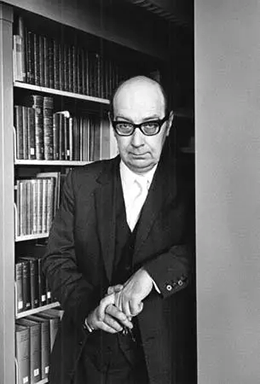 |
| Philip Larkin in a library. Photograph by Fay Godwin. © The British Library Board (Photo credit: Wikipedia) |
Philip Larkin……..
Poets favoured by Pimento: John Betjeman.
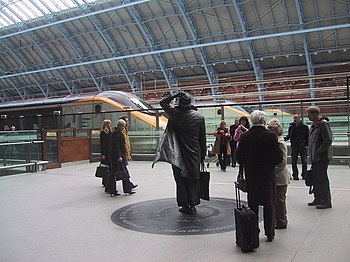 |
| English: John Betjeman and friends at St Pancras Station (Photo credit: Wikipedia) |
 |
| English: Wadebridge, The John Betjeman Centre Memorabilia Room. Here is the great man's desk and telephone from his home in Trebetherick. Also there to be seen is a superb collection of his books, medals, photographs and so on. While you are here, take the opportunity to have a cup of coffee to support the running of the centre as there is no charge to visit the memorabilia room. (Photo credit: Wikipedia) |
 |
| John Betjeman boards the train for his trip to Hunstanton (Photo credit: Wikipedia) |
 |
| Statue of John Betjeman at St Pancras station in London (Photo credit: Wikipedia) |
Some of the poets favoured by Pimento: Dylan Thomas
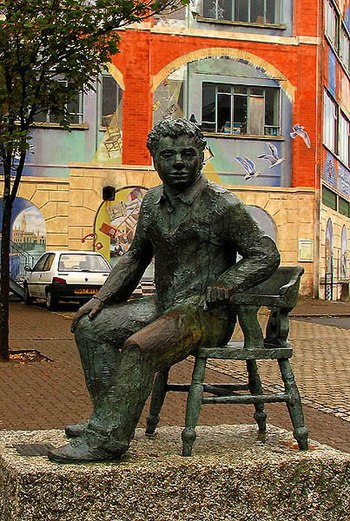 |
| English: Maritime Quarter: Swansea. A statue of Dylan Thomas, outside the Dylan Thomas Theatre at the Marina, Swansea. (Photo credit: Wikipedia) |
 |
| English: Dylan Thomas's shed. This is where Dylan Thomas wrote some of his poetry and stories. It's an old shed that is near to the boathouse where he used to live. (Photo credit: Wikipedia) |
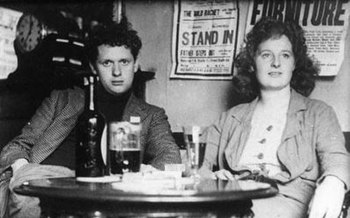 |
| Welsh poet and playwright Dylan Thomas, with his wife Caitlin (nee Macnamara) (Photo credit: Wikipedia) |
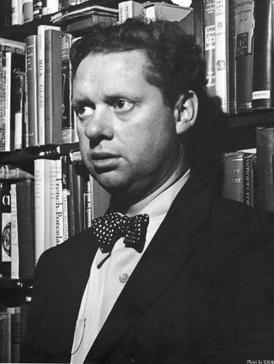 |
| Welsh poet Dylan Thomas (Photo credit: WikipediaDylan Thomas |
Meet the Poets: Susan Wallace.
Susan enjoyed poetry at school but then got distracted by other things for about fifty years.
During these decades she has taught and researched in the UK and overseas; published more than a dozen works of non-fiction; edited Oxford’s Dictionary of Education; and is currently Emeritus Professor of Education at Nottingham Trent University.
She admires particularly the work of Larkin, Betjeman and U.A. Fanthorpe.
Her own poetry, which has been published in a number of journals and anthologies, has been described as ‘neatly faceted and rich in slant rhyme.’
Monday, November 3, 2014
St Mary Magdalene Church, Lincoln, UK.
| English: St Mary Magdalene. (Photo credit: Wikipedia) |
A 'full house' were treated to some beautiful singing and poetry all commemorating the First World War.
Tuesday, October 28, 2014
Meet the Poets: Vernon Goddard
Vernon Goddard
Vernon is Welsh, married, a grandfather and currently living in Nocton. His poetry is mainly about childhood, places he has lived, people he has met. His current themes are around memory, relationships, family and the passing of time.
He has worked in education as Teacher, Lecturer, Principal of Cowbridge Community College and Director of Dyffryn Conference Centre and Botanical Gardens. Towards the end of his career he joined Lloyds Bank as Senior Manager, Operations, running its Management Centre in Surrey. At the time of the merger with TSB he ran all their Training establishments at Kingswood, Solihull, Telford and Guildford. At the time of retirement, on Millenium night, he project managed the Year 2000 operation for the Bank.
His favourite poets are John Clare, T.S.Eliot, Dylan Thomas, John Betjeman, and Ted Hughes.
The Pimento group of poets has been an ideal platform for developing and expanding his work and the further understanding of the nature and purposes of the written word.
Next Meeting of Pimento Poets: 10th November, 2014.
| English: Castle Square, Lincoln Castle Square, Lincoln looking east. From left to right ... Georgian houses, Leigh-Pemberton House, church of St.Mary Magdalen, Cathedral, Magna Carta public house. (Photo credit: Wikipedia) |
All existing and new members welcome…….
Vernon Goddard.
P.S…..And bring some poems….let's get reading and discussing…...
This Sunday: 2nd November at St Mary Magdalene Church starting at 3.00 pm…...
SUNDAY 2 NOVEMBER, 3.00 - 5.00pm
(including interval with tea & cake)
‘Long Time Passing’ – A Century of Wars
PIMENTO POETS with HUNGATE SINGERS
At ST MARY MAGDALENE CHURCH, BAILGATE, LINCOLN LN1 3AR
(on the corner of Castle Square, near the Tourist Information Centre)
An afternoon of Poetry & Song including popular songs from WW1 & WW2, folk songs and original poetry from Pimento Poets’ new book, ‘Long Time Passing’.
No need to book, just come along! Retiring Collection.
Sunday, October 26, 2014
Long Time Passing - A century of Wars…….Sunday, 2nd November 2014…….Starts at 3 p.m…...
| English: Flower of a Poppy (Papaver rhoeas) (Photo credit: Wikipedia) |
‘Long Time Passing’ – A Century of Wars
PIMENTO POETS with HUNGATE SINGERS
At ST MARY MAGDALENE CHURCH, BAILGATE, LINCOLN LN1 3AR
(on the corner of Castle Square, near the Tourist Information Centre)
An afternoon of Poetry & Song including popular songs from WW1 & WW2, folk songs and original poetry from Pimento Poets’ new book, ‘Long Time Passing’.
No need to book, just come along! Retiring Collection.
SUNDAY 2 NOVEMBER, 3.00 - 5.00pm
(including interval with tea & cake)
Friday, October 24, 2014
New work by Maureen Sutton 2014.
New Work by Maureen Sutton:
These three pieces of work were written by Maureen in response to Danica Maier’s ‘Stitch & Peacock’ Exhibition, currently on show at The Collection Museum in Lincoln. They were written between 27th September and 11th October, 2014. The Exhibition continues on display until the end of the year.
FLIGHTPATH
A flock of coloured birds
soar above
gallery’s installation
as if freed from hanging chains.
Feather patterns like herring-bone
on ancient stone walls mark out
each forked tail.
The throng threads their way
to the far brick wall,
settle on branches
tight as a hem-edged blanket.
Tiny letters mimic stitches
close as a stem on a leaf
vibrant as Jacobean silk.
STITCH and PEACOCK
From the inspiration of a Jacobean bedspread
Maier has given a new interpretation
to the formation of letters.
I now see more than a symbol
of speech sound.
Minute blue letters mirror embroidered samplers,
each tiny form repeated and repeated
until they morph into leaves and branches
look closer, Maier is having fun.
Letters depicted like stitches are words,
words become birds, they take flight
settle on branches and stems like raised
French knots on worked canvas.
A berry bright as rowan, proud as a peacock
catches my attention, like a skein of silk
threaded through the eye of a needle.
THROUGH A NEEDLE’S EYE
The conceited peacock has been exposed;
tail lifted to show what he’s really made of.
The artist has finally needled him
pinned the cock down, hidden
words between fan-feathers.
No bull, she’s on to him,
plucking out eyes,
he’s too dim
to realize,
full of
himself.
Copyright : Maureen Sutton 2014.
Subscribe to:
Comments (Atom)










